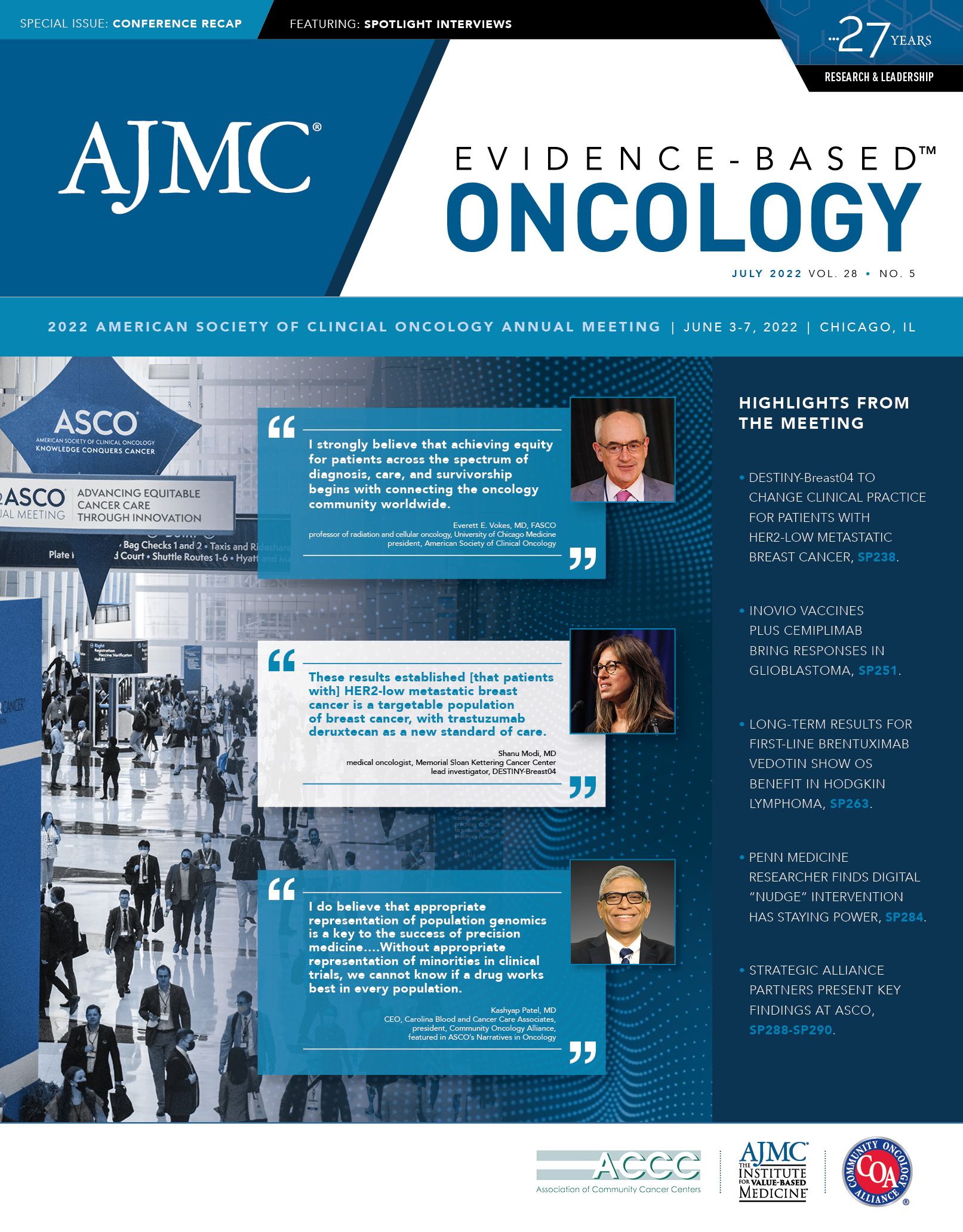- Center on Health Equity & Access
- Clinical
- Health Care Cost
- Health Care Delivery
- Insurance
- Policy
- Technology
- Value-Based Care
ASCO Spotlight With Thanos Zomas, MD: Hodgkin Lymphoma Outcomes Improve With Targeted Treatment
Thanos Zomas, MD, global medical lead for lymphoma and leukemia and for the Adcetris Program, Takeda Oncology, discussed results of the ECHELON-1 trial.
Updated results from the ECHELON-1 trial1 showed a significantly improved mortality risk and overall survival rate at 6 years when brentuximab vedotin was added to first-line chemotherapy, Thanos Zomas, MD, said during the 2022 American Society of Clinical Oncology Annual Meeting in June. Zomas, who is global medical lead for lymphoma and leukemia and for the Adcetris Program at Takeda Oncology, discussed the new data with Evidence-Based Oncology™ (EBO).
EBO: Can you discuss the unmet need for patients with newly diagnosed classical Hodgkin lymphoma?
Zomas: Hodgkin lymphoma is a relatively rare form of lymphoma. There are more than 100 different types of lymphoma, and Hodgkin lymphoma is one of them. It’s been considered, thankfully, a very curable disease, but despite this, there is a percentage—perhaps in the region of 20% to 30%—of patients who unfortunately relapse after their initial therapy, and so they require additional treatment. Most of the time this treatment is more intensive and repetitive. There is an unmet medical need there that requires better treatments in the beginning.
EBO: Why is finding optimal first-line treatment so important for these patients?
Zomas: The majority of these patients are relatively young. The average age of Hodgkin lymphoma patients is between 35 and 40 years—although we’ve seen patients at a much earlier age and at very [later age]. They are in the most productive phase of their life, so it’s very important to cure as many as possible with the first round of chemotherapy in order to avoid additional treatment, which is associated with a very negative impact on their quality of life, as well as some very unpleasant secondary [adverse] effects, including secondary malignancies, fertility problems, and cardiovascular [adverse] effects.
EBO: Can you discuss the design and end points of ECHELON-1?
Zomas: The ECHELON-1 study (NCT01712490) was an international study that included many countries across the world. It was a phase 3 fully randomized study that compared the standard of care of therapy in frontline treatment, which is called ABVD [doxorubicin (Adriamycin), bleomycin, vinblastine, and dacarbazine], with a new regimen called A+AVD [brentuximab vedotin (Adcetris), doxorubicin, vinblastine, and dacarbazine]. It basically substituted one of the weakest drugs of the ABVD regimen, bleomycin, with the anti-CD30–targeted agent brentuximab vedotin.
This trial started enrolling patients in 2012 and completed its enrollment in 2016. It created a lot of excitement because the disease is relatively rare. The fact that ECHELON-1 included a very large number of patients, [approximately] 1400 patients, created a lot of expectations and hopes.
EBO: What do the 6-year results of ECHELON-1 show?
Zomas: In this Congress for the first time, we report the first official overall survival analysis of the ECHELON-1 study, which showed a fairly significant survival advantage in favor of Adcetris arm, the A+AVD regimen, vs the standard of care. This regimen has shown very clearly, and for the first time in the past 20 years, that the addition of targeted agents in the regimen in frontline Hodgkin lymphoma treatment can reduce the risk of death by 41%. This corresponds to a very high survival rate. At 6 years median follow-up, [it is] approaching 94%.
Again, this may seem a very difficult target to [reach] in other types of lymphomas, as well as other types of cancer. It is very important to have this overall survival benefit in young [patients] because they can go back to their families, go back to their normal lives, and continue living and enjoying their life with their family and friends.
Reference
Ansell SM, Connors JM, Radford JA, et al. First-line brentuximab vedotin plus chemotherapy to improve overall survival in patients with stage III/IV classical Hodgkin lymphoma: an updated analysis of ECHELON-1. J Clin Oncol. 2022;40(suppl 16):7503. doi:10.1200/JCO.2022.40.16_suppl.7503

HEDIS Glycemic Goal Achieved Using Control-IQ Technology
December 22nd 2025A greater proportion of patients with type 1 diabetes who used automated insulin delivery systems vs multiple daily injections achieved the Healthcare Effectiveness Data and Information Set (HEDIS) glycemic measure.
Read More
Linking Data to Determine Risk for 30-Day Readmissions in Dementia
December 22nd 2025This study found that certain characteristics in linked electronic health record data across episodes of care can help identify patients with Alzheimer disease and related dementias at high risk of 30-day readmissions.
Read More
Performance of 2-Stage Health-Related Social Needs Screening Using Area-Level Measures
December 19th 2025Limiting health-related social needs screening to lower-income areas would reduce screening burdens; however, this study found a 2-stage screening approach based on geography to be suboptimal.
Read More
Impact of Medicaid Institution for Mental Diseases Exclusion on Serious Mental Illness Outcomes
December 17th 2025Medicaid’s Institution for Mental Diseases (IMD) rule bars federal funding for psychiatric facilities with more than 16 beds, but findings indicate that state waivers allowing treatment of serious mental illness in IMDs do not increase overall psychiatric hospitalizations.
Read More
